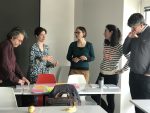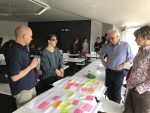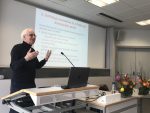[box title=”Download & Citation”]Sahakian, M and S. Lorek (Ed.) (2019). Consumption corridors: exploring concepts and implications. SCORAI Europe Workshop Abstracts, April 16-18, 2019, Geneva, Switzerland,. Sustainable Consumption Transitions Series, Issue 7.[/box]
On April 16-18 2019, a workshop on “Consumption Corridors: Exploring Concepts and Implications” was hosted at the University of Geneva under the banner of SCORAI Europe. The link between planetary boundaries and social justice towards “sustainable wellbeing” (Gough 2017) is a growing field of research and policy. This relates to the notion of “consumption corridors” (Di Giulio and Fuchs 2014), or a minimum and maximum consumption standard, which would allow individuals to live a satisfactory life without impeding others from doing the same – across the globe and for future generations. The workshop kicked off with a keynote talk by Prof. Ian Gough on the distinction between necessities and luxuries, which was discussed by Prof. Doris Fuchs who highlighted the structural challenges involved in any attempt at a sustainability transition, in what she termed “dysfunctional democracies”. Within the workshop, we explored the question of how to bridge protected needs and consumption corridors (Di Giulio and Defila), as well as the concept of Universal Basic Services as a promising approach towards ensuring a bundle of satisfiers, including health and education, but also transport and communications (Coote). Other papers dealt with the question of how to identify opportunities for change in a system, towards maximizing satisfiers that require the least material and energy inputs (Steinberger et al). Another conceptualizing the notion of satisfiers as social practices, thus evolving a social practice approach towards the normative goal of wellbeing (Anantharaman and Sahakian). Among the more promising ways forward: lower limits are seen as a necessity, with the view to social justice; the idea of upper limits was seen compelling, in relation to consumption practices specifically, and more and more public debates are emerging around upper limits; the need to engage in societal discussions and experimentations around needs and capabilities is seen as promising, as opposed to desires (Guillen-Royo); and the importance of grappling with habitual practices in earnest, or the stickiness of everyday life and existing institutional and infrastructure arrangements. The book of abstracts can be found here.
We are grateful to the following entities for their support: The Swiss National Science Foundation; the Institute of Environmental Governance and Territorial Development and the Faculty of social sciences at the University of Geneva; and the LILI project financed by the The Leverhulme Trust , coordinated by Julia K. Steinberger at the University of Leeds.
Organizers and hosts: Marlyne Sahakian and Katia Vladimirova, University of Geneva (UNIGE)
Co-organizers: Julia Steinberger, University of Leeds and visiting professor at UNIGE; Manisha Anatharaman, St Mary’s College and visiting professor at UNIGE; Antonietta Di Giulio, University of Basel.
If you are interesting in joining in these debates and discussions, please contact marlyne.sahakian@unige.ch.




